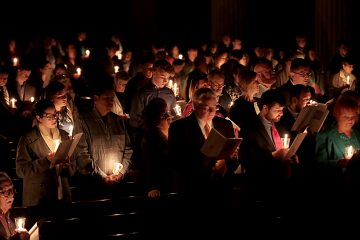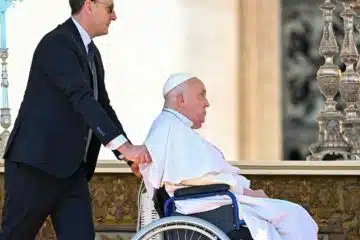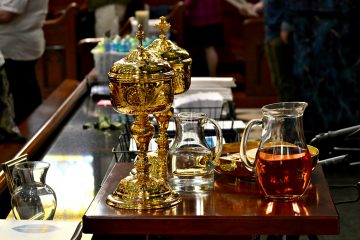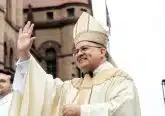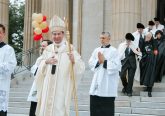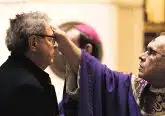A Closer Look: The Profound Irresolution of Christian Citizenship
 Twentieth Century theologian John Courtney Murray, S.J., remains the most important interpreter of the American Catholic experience of citizenship and religious liberty. Featured on the cover of Time magazine in 1960, Father Murray was a chief architect of Vatican II’s Declaration on Religious Liberty. In his seminal book, We Hold These Truths, he famously noted, “The question is sometimes raised, whether Catholicism is compatible with American democracy.” But this “impertinent” way of asking the question “inverts the order of values,” he continued. “It must . . . be turned round to read, whether American democracy is compatible with Catholicism.”
Twentieth Century theologian John Courtney Murray, S.J., remains the most important interpreter of the American Catholic experience of citizenship and religious liberty. Featured on the cover of Time magazine in 1960, Father Murray was a chief architect of Vatican II’s Declaration on Religious Liberty. In his seminal book, We Hold These Truths, he famously noted, “The question is sometimes raised, whether Catholicism is compatible with American democracy.” But this “impertinent” way of asking the question “inverts the order of values,” he continued. “It must . . . be turned round to read, whether American democracy is compatible with Catholicism.”
Father Murray’s “turned round” question poses a challenge for many of us. In practice, if not in principle, we Catholics often live our moral and political lives as though American democracy is the rule by which Catholicism is to be judged and practiced. This can take one of two problematic forms: Either we subordinate Catholic principles to American ones, making “American” the standard and “Catholic” the conditional qualifier; or we collapse Catholicism into Americanism, such that we are not even able to see a distinction between them, thinking that being a patriotic American is coextensive with being a pious Catholic. These dangers are manifest in the way that we think about what it means to be a conscientious citizen and how we think about political freedom.
EVERY HOMELAND IS A FOREIGN COUNTRY
In a Second Century letter known as Epistle to Diognetus, a Christian apologist describes the social and political predicament of the early Church during a time of persecution. “Christians are indistinguishable from others by nationality, language or custom,” the anonymous author explained. “They do not inhabit separate cities of their own,” and “with regard to dress, food and manner of life in general, they follow the customs of whatever city they happen to be living in.”
While a variety of political and cultural customs are compatible with Christians’ faith and practice, they neither identify faith with, nor collapse it into, those traditions. And this makes them “extraordinary,” the Epistle continues: “They live in their own countries as though they were only passing through… Any country can be their homeland, but… their homeland, wherever it may be, is a foreign country.”
Thus, the Epistle betrays an important tension between Christian faith and political engagement: While various cultural and political particularities are compatible with Christian faith, that faith also calls them to transcend those alien identifications.
The Christians the Epistle describes seem to understand good citizenship as being observant of the laws of the state, but not necessarily endorsing the philosophical foundations of those laws, or underwriting their values. In fact, it is clear from the Epistle that they are doing something (or refusing to do something) that is getting them killed. In other words, they are good citizens, but not necessarily enthusiastic patriots. This is a salutary lesson for us.
We have a mandate to participate in civic life. As the Catechism of the Catholic Church states, we have an “ethical obligation” to “[a]s far as possible . . . take an active part in public life.” (CCC 1916, 1915.) Fulfilling this obligation may entail political activity, but it cannot be reduced to that or simply identified with politics. Civic friendship – citizenship – is broader and more fundamentally important than political activity or identity. To ignore this crucial point is to conflate citizenship (an obligation) with patriotism (a possible option), which can lead to reducing faith to political identity.
The Catholic social doctrine of subsidiarity, most famously expounded in Pope Pius XI’s 1933 encyclical, Quadragesimo Anno, is the principle that our civic and political lives should be exercised primarily and most fundamentally in the communities where we live, at the closest and least complex level available.
Applied to questions of citizenship, subsidiarity suggests that national political identity and activity are less urgent demands for civic life than local, non-political expressions of civic responsibility. It tells us that we should not define moral, civic or political commitments by nationalist, patriotic or partisan identification, but by being civic friends to our families, parishioners, neighbors and, yes, our enemies. Main Street should be a more immediate concern than Pennsylvania Avenue; reconciliation is more important than political triumph.
This is not to deny the legitimacy of political activity, but to question partisan identification, which often seems to override Christian civic friendship. Neither patriotism nor party identification should define our moral positions. To the contrary, our moral positions must always precede and question both patriotic fervor and partisan zeal. At least in the American context, a Christian can be more supportive of the positions of one party than another, but we cannot simply identify ourselves by political party. If we ignore this, we tend to define our commitments by party platforms rather than by the Christian virtues.
Patriotism is the means by which the Christian calls the nation to judgment, not by the nation’s own standards, but rather by the standards of the Gospel. Put another way, it is not the role of the Christian to make America better at being America. Rather, it is the role of the Christian to be a witness to the moral life that transcends the moral and political philosophy of America (or any other nation) and calls it to judgment in the terms of theological truth. In this way, we will always be following Father Murray’s mandate
of questioning whether American democracy is compatible with Catholicism.
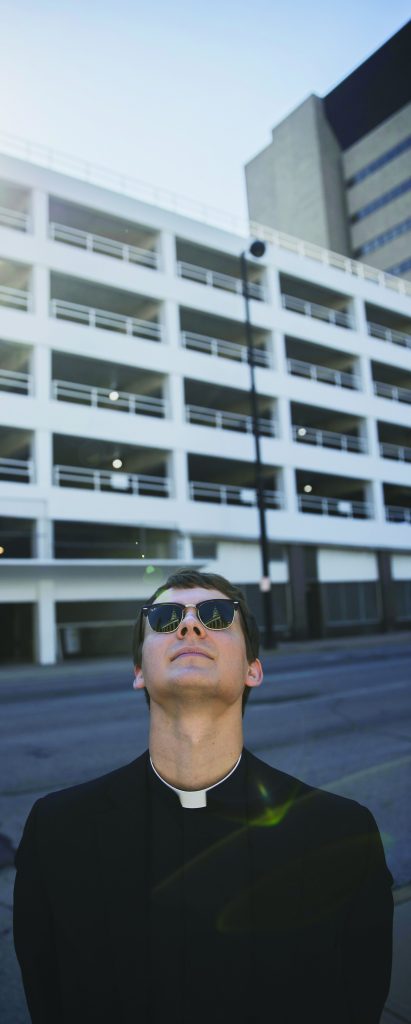
FOR FREEDOM, CHRIST SET US FREE
In his book, The Moral Tradition of American Constitutionalism, Duke University theologian and law professor H. Jefferson Powell provocatively asserts, “The liberty of which constitutionalism has spoken has never been Christian freedom, and so the degeneration of the tradition’s internal rationality is not itself of grave importance to Christians.” This is a profoundly important lesson for Christians to understand, and it is a reminder that we cannot identify American notions of liberty with authentic Christian freedom.
Christian freedom was won by blood on wood at Calvary, not by ink on parchment at Philadelphia. And this freedom is realized not by the exercise of American “rights,” but rather by Christian virtues. Our freedom is directly proportionate to adherence to the obligations of Christian discipleship. As we embrace the truth of those obligations, we move toward the true freedom for which Christ has set us free.
In contrast, the American tradition of freedom is rooted in the fundamental notion that any positive moral obligation is an impediment to true liberty. While few of us would call ourselves “libertarians,” we often order our moral lives as though we are. We think of freedom as defined by throwing off constraints rather than embracing truth. But if American freedom is not Christian freedom, we must be far more cautious in the way that we embrace it than we often are. This does not mean that we cannot be good citizens. Indeed, we should be. But our citizenship calls us to sit in skeptical judgment of all politics, including the politics that flow from truncated or faulty understandings of liberty.
It is not the role of the Christian to change the world, but to make disciples. When disciples are made the world will change. The mandate of discipleship certainly encompasses and orders our civic responsibility, and thus our faithful citizenship. But we must resist the presumption to underwrite the values of any regime with the virtues of the Gospel, because we inevitably wind up compromising the latter to fit the former.
In an article entitled, “The Kingship of Christ: Why Freedom of ‘Belief ’ Is Not Enough,” theologians Stanley Hauerwas and Michael Baxter wrote, “Christians are called first and foremost not to resolve the tension between church and state, but to acknowledge the Kingship of Christ in their lives, which means leaving church-state relations profoundly unresolved, until the day when He comes again in glory” (emphasis added). I take this not as a description to be regretted, but rather as a mandate to be observed.
Our desire to resolve the problem tempts us to collapse Catholic faith into American politics. But if we do recognize, as we should, that no
resolution is likely, we must do so in a sober and profound way. The best way to answer Father Murray’s question is to acknowledge the profound irresolution, to confess Christ as king and to love our neighbor as God loves us. This is authentic Christian citizenship.
 DR. KENNETH CRAYCRAFT is an attorney and the James J. Gardner Family Chair of Moral Theology at Mount St. Mary’s Seminary & School of Theology. He holds a Ph.D. in moral theology from Boston College, and a J.D. from Duke University School of Law.
DR. KENNETH CRAYCRAFT is an attorney and the James J. Gardner Family Chair of Moral Theology at Mount St. Mary’s Seminary & School of Theology. He holds a Ph.D. in moral theology from Boston College, and a J.D. from Duke University School of Law.
A Closer Look appeared in the September issue of The Catholic Telegraph Magazine. For your complimentary subscription, click here.






